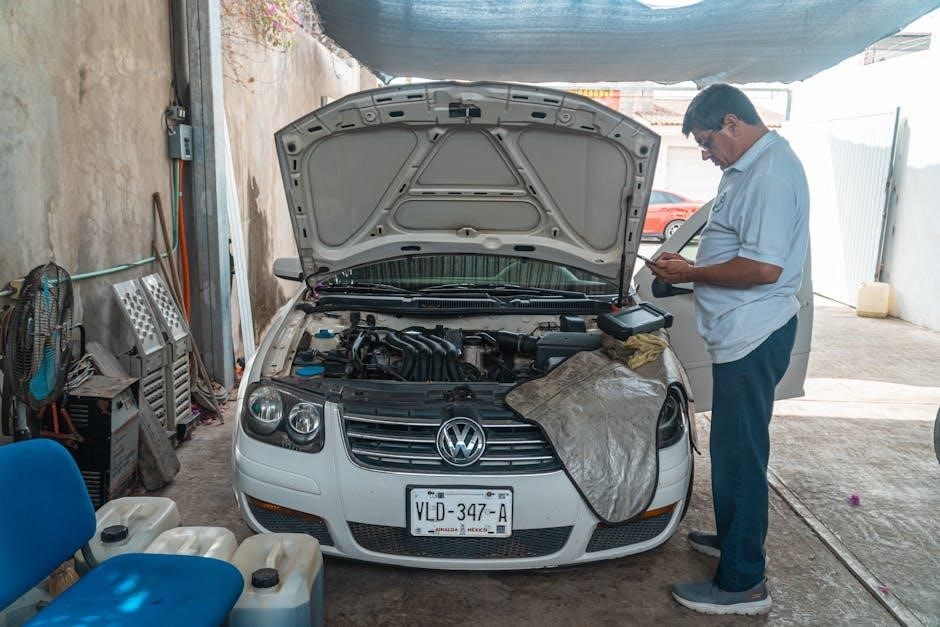Oil pressure issues in Volkswagen engines, such as Tiguan and Passat, can cause severe damage. Issues often stem from faulty sensors, oil pump failure, or blockages. Addressing the ‘Oil Pressure Engine Off’ warning promptly is vital to protect your engine.

Understanding Oil Pressure and Its Importance
Oil pressure is crucial for engine lubrication, preventing friction and overheating. Proper pressure ensures smooth operation and longevity of moving components, vital for Volkswagen engines.
2.1 What Is Oil Pressure and How Is It Measured?
Oil pressure refers to the force of engine oil circulating through the system. It’s measured in pounds per square inch (PSI) or bars using a pressure gauge or sensor. In Volkswagen engines, pressure ranges typically between 1.2 to 1.6 bar. A sensor monitors this pressure, sending data to the ECU, which triggers warnings if levels drop below safe thresholds, such as the “Oil Pressure Engine Off” alert. Proper measurement ensures optimal engine lubrication and performance.
2.2 The Role of Oil Pressure in Engine Lubrication
Oil pressure is critical for engine lubrication, ensuring moving parts are coated with oil to reduce friction and wear. In Volkswagen engines, it helps cool components, removes contaminants, and maintains hydraulic pressure for systems like variable valve timing. Low pressure can lead to inadequate lubrication, causing engine damage or failure, as indicated by the “Oil Pressure Engine Off” warning. Maintaining proper pressure is essential for longevity and performance.

Common Causes of Low Oil Pressure in Volkswagen Engines
Low oil pressure in VW engines is often caused by faulty sensors, oil pump failure, clogged pickup tubes, or worn gaskets. These issues disrupt oil flow and pressure, triggering warnings like “Oil Pressure Engine Off,” as noted in the manual and owner reports.
3.1 Faulty Oil Pressure Switch or Sensor
A faulty oil pressure switch or sensor is a common cause of low oil pressure warnings in VW engines. The sensor monitors oil pressure and sends data to the dashboard. If it fails, it may trigger false alarms or inaccurate readings. Replacing the switch, often located near the oil filter, can resolve the issue. Testing the sensor with a pressure gauge ensures accurate diagnosis. Addressing this promptly prevents unnecessary engine damage or system malfunctions, as indicated in owner reports and manuals.
3.2 Oil Pump Failure or Malfunction
Oil pump failure is a critical issue causing low oil pressure in VW engines. The pump circulates oil, ensuring proper lubrication. If it malfunctions or wears out, oil flow is disrupted, leading to engine damage. Signs include low pressure warnings and engine stalling. Replacing the pump or checking for excessive turbine play, as noted in repair forums, is essential. Immediate action prevents severe engine damage, ensuring longevity and performance, as highlighted in VW owner experiences and diagnostic reports.
3.3 Clogged Oil Pickup Tube or Screen
A clogged oil pickup tube or screen is a common cause of low oil pressure in VW engines. Debris, dirt, or carbon buildup can block the flow of oil to the pump, reducing pressure. This restriction prevents proper lubrication, risking engine damage. Regular inspection and cleaning of the pickup tube are crucial to maintain optimal oil flow. If blocked, the tube or screen may need replacement to restore normal oil pressure, as suggested in various VW maintenance forums and repair guides.
3.4 Worn or Leaking Oil Filter Housing Gaskets
Worn or leaking oil filter housing gaskets can lead to low oil pressure in VW engines. These gaskets, located on the engine block, can degrade over time due to heat and wear. Leaks reduce the system’s ability to maintain pressure, potentially causing engine damage. Replacing these gaskets is often a straightforward fix, as highlighted in VW repair forums. Ensuring proper sealing is crucial to prevent oil pressure drops and maintain engine performance. Regular inspections can help identify such issues early.
3.5 Carbon Buildup in Engine Oil Pathways
Carbon buildup in engine oil pathways is a common issue in VW engines, particularly in older models. Over time, oil residue can solidify, obstructing oil flow to critical components. This reduces oil pressure, triggering warnings like “Oil Pressure Engine Off.” Cleaning or replacing the oil pickup tube and screen can resolve this. Regular oil changes and using high-quality filters help prevent such buildup, ensuring proper lubrication and maintaining optimal engine performance. Addressing this early is crucial to avoid costly repairs.
Warning Signs of Low Oil Pressure in VW Vehicles
Dashboard warning lights, engine stalling, or unusual noises indicate low oil pressure. The “Oil Pressure Engine Off” alert signals critical pressure loss, requiring immediate action.
4.1 Dashboard Warning Lights and Alarms
The first sign of low oil pressure in VW vehicles is often a dashboard warning light. A flashing red oil light or “Oil Pressure Engine Off” message indicates critical pressure loss. These alerts are triggered by the oil pressure sensor detecting levels below the safe threshold. Ignoring these warnings can lead to severe engine damage. Immediate action is required, such as stopping the engine and checking oil levels. Sometimes, the issue may be a faulty oil pressure switch or sensor, which can be replaced to resolve the problem.
4.2 Engine Stalling or Rough Running
Low oil pressure can cause a Volkswagen engine to stall or run rough, especially during acceleration or when driving uphill. If the oil pressure drops, critical engine components lose proper lubrication, leading to increased friction and potential damage. Stalling may occur as a protective measure to prevent further wear. Immediate action is necessary to avoid costly repairs, such as checking oil levels and addressing underlying causes like a faulty oil pump or clogged oil passages.
4.3 Unusual Noises from the Engine
Unusual engine noises, such as grinding, ticking, or clunking, can signal low oil pressure in a Volkswagen engine. These sounds occur when metal components like lifters or valves lose proper lubrication. Ignoring these noises can lead to severe engine damage. If such sounds appear alongside an “Oil Pressure Engine Off” warning, immediate action is crucial to prevent costly repairs and ensure the engine’s longevity; Always address these symptoms promptly to maintain your vehicle’s performance and reliability.

Steps to Take When “Oil Pressure Engine Off” Warning Appears
Immediately turn off the engine to prevent damage. Check oil levels and ensure they are within the recommended range. Contact roadside assistance or a mechanic for professional diagnosis and repair to avoid further complications.
5.1 Immediate Actions to Protect the Engine
When the “Oil Pressure Engine Off” warning appears, shut off the engine immediately to prevent damage. Avoid restarting the engine, as low oil pressure can cause severe wear to internal components. Pull over safely and engage the parking brake. Do not continue driving, as this could lead to costly repairs or complete engine failure. This step ensures minimal damage and allows for a proper diagnosis by a professional mechanic.
5.2 Checking Oil Level and Condition
After stopping the engine, check the oil level using the dipstick or electronic gauge. If the level is low, add the recommended oil type from the owner’s manual. Ensure the oil is clean and free of debris. If the oil appears dirty or degraded, consider a professional inspection. Proper oil level and condition are critical for maintaining engine health and preventing further pressure issues. Always refer to the manual for specific guidelines to avoid overfilling or using incorrect oil.
5.3 Contacting Roadside Assistance or a Mechanic
If the issue persists after checking the oil level, contact roadside assistance or a certified mechanic immediately. Do not attempt to drive the vehicle, as this could cause irreversible engine damage. Roadside assistance can provide towing services to a nearby repair shop. For VW owners, refer to the provided roadside assistance number (e.g., 0330 1003 241) in the owner’s manual. A professional inspection is essential to diagnose and resolve the root cause of the low oil pressure warning.

Diagnosing the Root Cause of Low Oil Pressure
Use a pressure gauge to measure oil pressure, inspect the oil filter, and check for blockages in the oil pump or pickup tube for accurate diagnosis.
6.1 Using a Pressure Gauge to Test Oil Pressure
Attach a pressure gauge to the engine’s oil pressure port, located near the oil filter housing. Start the engine and monitor the reading. Compare the results to the manufacturer’s specifications, typically between 1.2 to 1.6 bar for VW engines. Low readings indicate issues like a faulty oil pump or clogged pickup tube. Ensure the oil level is correct before testing. This method provides precise data to diagnose the root cause of low oil pressure accurately.
6.2 Inspecting the Oil Filter and Housing
Inspect the oil filter and housing for signs of wear or leaks. Worn gaskets in the housing can cause oil pressure drops. Check for excessive play in the turbine and ensure the oil filter is properly seated. If damaged, replace the filter and gaskets. This step helps identify common issues leading to low oil pressure, ensuring accurate diagnosis and effective repairs. Always refer to your VW manual for specific part numbers and replacement procedures.
6.3 Checking for Blockages in Oil Passages
Blockages in oil passages can significantly reduce oil flow, leading to low pressure. Inspect the oil pickup tube and screen for debris or carbon buildup, especially in models like the Tiguan and Passat. Clean or replace the tube if obstructed. Additionally, check the cam bridge screen, as it may cause oil starvation if damaged. Addressing these issues ensures proper lubrication and prevents severe engine damage. Regular maintenance can help avoid such blockages and maintain optimal oil pressure levels.

Repair and Maintenance Tips
Addressing oil pressure issues in VW engines often involves replacing the oil pump or oil filter housing gaskets. Clean or replace the oil pickup tube and screen to ensure proper oil flow. Regularly use high-quality oil and filters to prevent blockages. Consult the owner’s manual for model-specific recommendations to maintain optimal engine performance and avoid future issues.
7.1 Replacing the Oil Pressure Switch
Replacing the oil pressure switch is a common fix for low oil pressure warnings. Located under the oil filter, it’s easily accessible. Simply disconnect the electrical connector, remove the old switch, and install a new one. Ensure it’s tightened properly to avoid leaks. This inexpensive repair can resolve faulty readings and prevent further engine issues. If unsure, consult a mechanic or the VW owner’s manual for detailed instructions.
7.2 Cleaning or Replacing the Oil Pickup Tube
Cleaning or replacing the oil pickup tube can resolve low oil pressure issues. Over time, it may clog with debris or carbon buildup, restricting oil flow. Remove the tube, clean it thoroughly, and inspect for damage. If damaged, replace it with a new one. Proper installation ensures optimal oil circulation. Regular maintenance helps prevent such blockages, protecting your engine from damage. Always refer to the VW owner’s manual for specific instructions and safety precautions during this process.
Preventative Maintenance to Avoid Oil Pressure Issues
Regular oil changes, monitoring oil levels, and checking for leaks can prevent low oil pressure. Using the correct oil viscosity ensures proper engine lubrication and performance.
8.1 Regular Oil Changes and Filter Replacements
Regular oil changes are crucial to maintain optimal engine lubrication and prevent low oil pressure. Use the viscosity specified in your VW manual. Replace the oil filter during each change to ensure contaminants don’t affect oil flow.Dirty filters can lead to reduced oil pressure, risking engine damage. Schedule oil changes every 5,000 to 7,500 miles, depending on your model and driving conditions. Clean oil ensures smooth engine operation and prevents blockages in critical pathways.
8.2 Monitoring Engine Temperature and Performance
Monitoring engine temperature and performance is vital to prevent oil pressure issues. Excessive heat can reduce oil viscosity, lowering pressure. Use a pressure gauge to test oil pressure regularly. Check for warning lights on the dashboard, as they often indicate temperature or performance issues. Addressing these problems promptly helps maintain optimal engine function and prevents damage. Regular checks ensure your VW runs smoothly and oil pressure remains stable, avoiding costly repairs and extending engine life. Consistent monitoring is key to longevity.

Volkswagen-Specific Recommendations
Volkswagen-specific recommendations include adhering to model-specific oil guidelines, such as using synthetic oil for newer models. Regular oil changes and filter replacements prevent pressure issues.
9.1 Model-Specific Oil Pressure Guidelines
Volkswagen engines, such as the Tiguan and Passat, have specific oil pressure requirements. For instance, models like the Passat B6 often require synthetic oil to maintain optimal pressure. Older models may benefit from 5W-40 oil for better viscosity. Always refer to the owner’s manual for exact specifications, as ignoring these guidelines can lead to low oil pressure warnings. Regular monitoring of oil levels and condition is crucial to prevent engine damage. Consulting a VW specialist ensures adherence to these recommendations.
9.2 Consulting the VW Owners Manual
Consulting the VW owner’s manual is crucial for addressing the “Oil Pressure Engine Off” warning. The manual instructs to stop the engine immediately and check oil levels. If levels are low, add oil to the recommended level. It also advises monitoring engine temperature and ensuring correct oil viscosity for your model. Adhering to these guidelines helps prevent engine damage. Always refer to the manual for model-specific instructions to ensure proper maintenance and safety.
Addressing “Oil Pressure Engine Off” warnings in Volkswagen vehicles requires immediate action to prevent engine damage. Always stop the engine, check oil levels, and consult the owner’s manual for guidance. Regular maintenance, such as oil changes and inspections, can help prevent issues. Ignoring low oil pressure warnings can lead to costly repairs. Prioritize your engine’s health by following VW-specific recommendations and seeking professional help when needed to ensure long-term reliability and performance.
